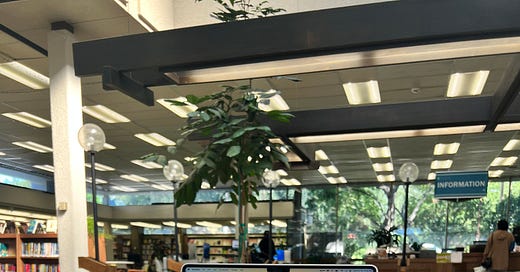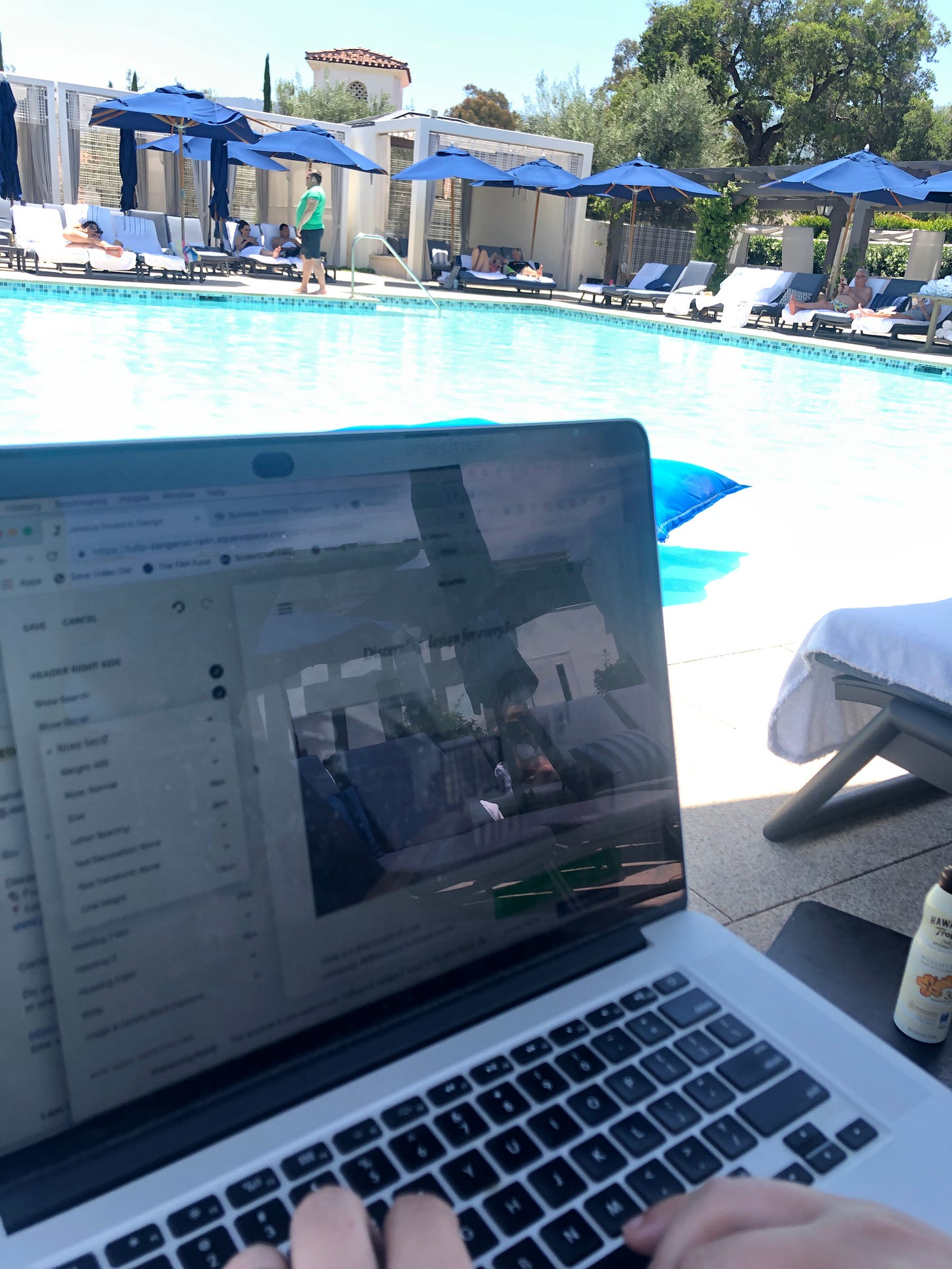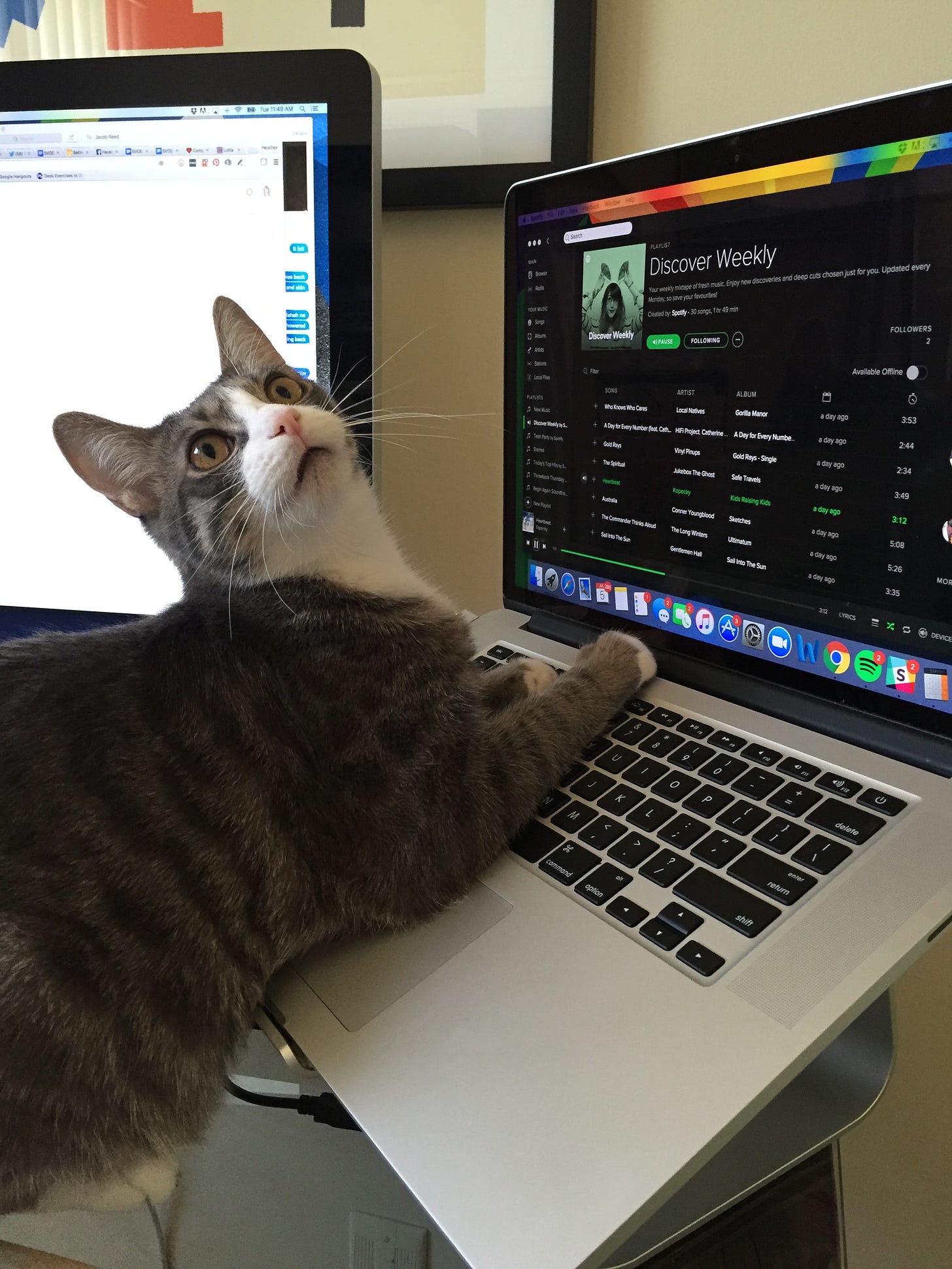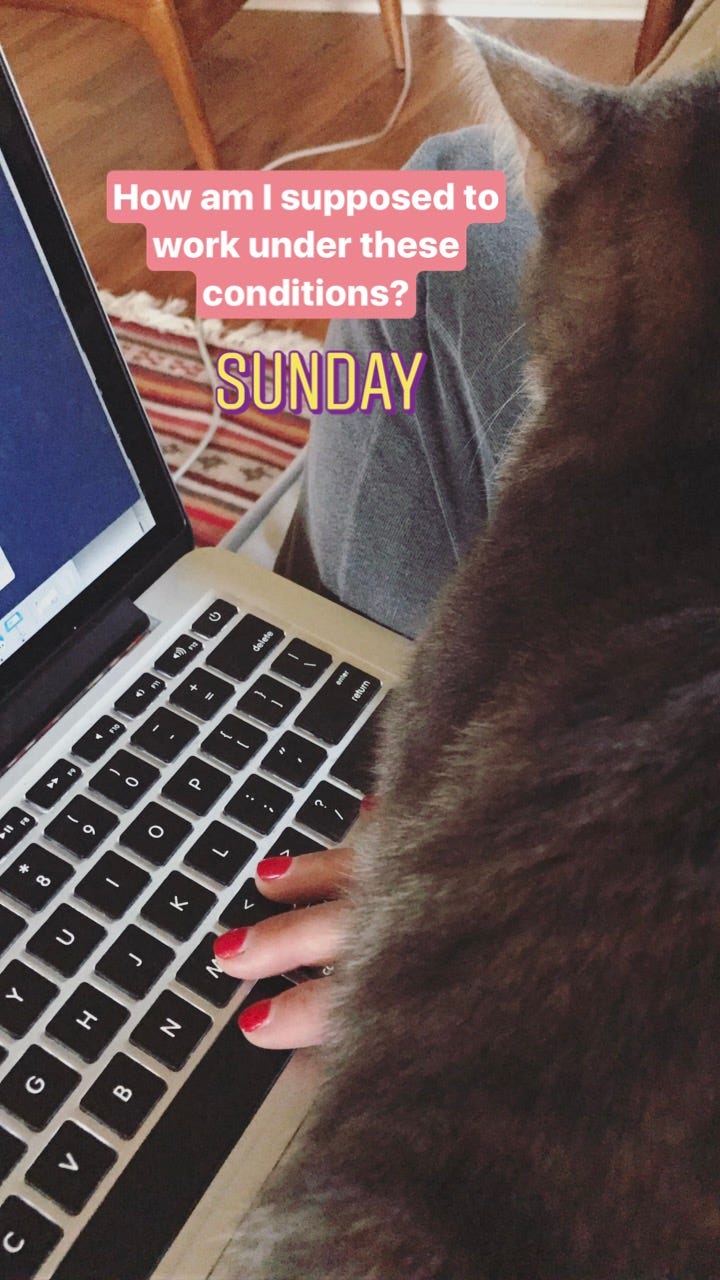Heather!! God your newsletters have the power to make me feel like we’re friends already. Long-time fan and follower here. I’d love your input/reassurance about the freelance/entrepreneurial route. I’d like to go full time freelance by 2025, but something about being entirely relient on myself to be paid and scale a business is both electrifying and horrifying, especially as a 36 year old who’s been nine-to-fiving since I was 23. I know there’s potential, and I am so ready for the flexibility freelancing provides, but sheesh, does it feel daunting to take the plunge. How was your experience freelancing for so many years, and do you have any wisdom to share with a rookie? Love ya!
Oh boy! Someone finally responded to the advice questionnaire I always include at the bottom of my newsletter.
I love this question! I have freelanced in some way for ten years, but as my full-time work for the past five years (save one year at a startup in between), I’ve learned a great deal about what it takes and how to make it work. Why should you listen to me? At the height of my freelancing, I had secured eight retainer clients and grossed about $240k for the year––all completely on my terms. Maybe I’m biased, but that’s pretty damn impressive! But you don’t see in that sentence how hard I hustled to earn it, the weekends, the long hours, and the frustrating client moments that led me there.
My experience has garnered so much advice I’ve long wanted to share, but it felt weird to do so unsolicited. Who am I to tell you how to do your work (until Spring when I finish my masters in positive organizational psychology 😆)
But I have finally been solicited! So, let’s dive into my mini-master class.
Why go freelance?
There are many reasons to go freelance. The main ones are obvious: autonomy and freedom. The best times to go freelance sit on opposite ends of the spectrum: when you have everything and nothing to lose.
When you have everything to lose, it likely means that your plate has become uncomfortably full of obligations, and lightening the load in one area would potentially save the rest. For example, though it wasn’t entirely by choice, being a freelancer with an infant and toddler was extremely helpful.
Conversely, when you’re sitting in a lull, craving a change, and don’t have many obligations or responsibilities outside of yourself (i.e., you don’t have dependents, that’s also an indicator that trying your hand at a freelance career might be right. You don’t have much to lose, right?
Does freelance live up to the hype?
The rumors are true. Being a freelancer is––well––freeing! If the work is flowing like wine in the Sonoma Valley, it’s easier to set boundaries, your schedule, workload, and even the type of work when you are a freelancer. I love being the guest star on a team. I get to swoop in without all the baggage of a full-time employee and tackle challenges with fresh perspectives and a positive attitude. People love having me Mary Poppins with a spoonful of sugar and being a pinch hitter they desperately needed. Then, I get to float away to my next dysfunctional family once my work there is done.
Above all, in theory, answering to yourself is wildly more appealing than reporting to a manager who may or may not have your best interest in mind. More often than not, you can’t choose your boss, but you can always bet on yourself. This, of course, depends entirely on who “yourself” is.
Are you cut out for freelance life?
Freelance life might seem like leisurely lunches and workout classes in the middle of the day while every other schmuck is stuck in an office or chained to their desk, but it’s much more complex. It’s volatile, stressful, and completely unpredictable. For example, I once lost three retainer clients within one week, reducing my monthly dependable income by thousands of dollars in a few days.
With ubiquitous and realistic scenarios like that in mind, it’s essential to consider whether or not this is the right choice for you from three angles: logistics, personality traits, and skill set.
Logistics
Insurance: Do you have a way to get affordable health insurance that is not provided by your employer? Because… you need to figure that out! You’ll very quickly learn that this is extremely expensive out of pocket if you can’t get on a partner’s employer plan.
Finances: Do you have enough savings to help you get started, or in case of emergency if projected work falls through? Do you have a trusted accountant to help guide you through your taxes and answer questions? Are you prepared to set aside 20-35% of your income for taxes and still have enough income to live? And, how good are you at managing money and knowing how much income you need to live comfortably? Having a handle on this is important before you are solely responsible for your income.
Office: Do you have a dedicated workspace? Whether it’s a room in your house, co-working spot, or corner of the living room, it’s crucial to have a sense of place that’s just for work, or you might not be able to find the discipline and consistency necessary to replicate the income and routine of a 9-5 role. Remember how, even though we weren’t assigned seats in school, everyone mostly sat in the same spot in every class anyway? It’s a way to control your environment to learn better or be more productive. It’s a physical trigger that it’s time to work, just like your bed tacitly tells you it’s time to sleep.
Schedule: It might seem contradictory to bring this up with the topic of freelance, but are you prepared to work weird hours, weekends, and vacations? Unless you can charge an excessive amount of money, sometimes you don’t have a choice about when or how the work comes. It might be in spurts or piecemealed together. As a freelancer, no one will pay you to take days off. Freelance can make it easier to have flexibility in the day-to-day, but in the big picture, it can often be more constraining than you may realize.
Personality
Risk: How comfortable are you with risk? Take an honest look at other areas of your life. How did you handle uncertainty? Do you shrug it off and embrace the ride, or do you tend to panic from potential instability? The answer may indicate how right freelance life is for you. Neither is right or wrong!
Tenacity: How do you deal with challenges? Is it easy to push through roadblocks, or do you take the path of least resistance? It’s not a judgment! But, freelance life often has periods where there is no work, you don’t get the gig, or you have a client you can’t stand but need the money. If you don’t typically keep pushing when things get hard, it might be more difficult for you when you’re alone.
Discipline: How disciplined are you in other areas of your life? Do you set a bedtime or workout routine you never break? That’s a good indicator of how you’d be as a freelancer. Days can get unstructured quickly without a timecard to punch, an authority figure to check in with, or even a regular team to put meetings on your calendar. Being freelance takes tremendous discipline to set working hours, proactively schedule meetings, and be intrinsically motivated to complete work–particularly more long-term, strategic, or ambiguous projects without explicit instructions.
Flexibility: How comfortable are you with switching gears? And can you do it quickly? Work may not be steady; it might come in spurts, or it may go away in an instant. Clients expect you to roll with the side effects of any punches they’re dealt.
Organization: How well can you project manage yourself? How organized are your Google Docs? Do you have a preferred naming convention? These are all questions and indicators of your comfort level with the organization. I only hope you have enough client work to pressure test your capacity! At one time, I was juggling eight clients and three different email accounts, calendars, and Slack channels. Strong organizational skills will enable you to make every client feel like they are your only client. I made it work to keep the clients and the revenue, and I have my keen organizational skills to thank.
Boundaries: How skilled are you at setting boundaries? You may need to work weekends or on vacations. I often half-joked that every day was the same as a freelancer. There’s always work, reasons to try and get ahead, and pressure to keep the engine running so it doesn’t stop. Remember, as a freelancer, there are no paid holidays. You have to create that for yourself. I, myself, am terrible at this!
Ego: Do you believe any work is beneath you? As a freelancer, this type of attitude could be your downfall. I generally operate under the world view that all work is important and money is money, which is how I believe I can consistently crack six figures as a freelancer. To give you an idea, at the same time, I was co-writing a book for Harper Collins and also writing podcast ads for Blinds.com––while one might sound more prestigious, they both supported my family just the same.
Skill Set
Mastery: How good are you at what you do? Are you confident you can bring expertise or speed to a project or a team that doesn’t already exist? Typically, freelancers are brought on because they’re short on manpower and expertise. Sometimes, you’ll be a body to fill; for others, you’ll be the expert they don’t already have. It’s always better to be an expert, regardless of the job. It’s worth auditing and tiering your skill set based on areas where you can lead and those you can support. It will help you sell yourself with a firm understanding of where you fall on the scale of mastery in the skills you have to offer.
Differentiation: Why would someone hire you over another expert or consultant? In addition to knowing how good you are at any given skill, it’s important to understand why you’re uniquely qualified to execute these skills. Is it your education, upbringing, cultural background, or work experience? Know your unique selling points.
Passion: Do you love what you do? At least, do you love parts of it? At the end of the day, you have to love what you do so much that you’re willing to put up with all the bullshit I’ve described. Freelance, as I’ve mentioned, requires a lot of internal motivation, and having a passion for the work can give you a giant head start.
Autonomy: Can you work alone? Not like, CAN you, but WILL you for weeks and months. Sometimes, you’ll be placed with a team and invited to Slack. Being able to ideate, execute, and produce independently is a critical skill in freelancing. Remember, freelancers are outsourced, which means you are an outsider and working on your own for the most part. It’s ok to crave teamwork but not want to be on a team full-time. (That has been my experience as a freelancer!) There are ways to obtain a sense of belonging alongside your freedom.
How to go freelance
Sometimes, going freelance is a necessity. Layoffs, toxic work environments, and a dismal job market force you into freelance life to make a living wage. I’ve experienced both. Whether it’s a conscious or involuntary decision, I have some advice on how to make it happen.
Unless you’re a business consultant, you likely didn’t go to school to learn the ins and outs of running a company. Accept that there will be a learning curve. If you have the luxury of going freelance on your terms, I recommend starting with the training wheels of one or two small clients on nights and weekends while you’re still working full-time. You’ll make mistakes with a safety net, understand how you work, and start building momentum before you leave the gate. If you don’t have that luck…then buckle up.
Decide how you want to work.
You might not know how you like working as a freelancer right away, so it’s best to try anything and everything that comes your way! You may learn that you prefer being embedded on a team as a regular contractor or that you like more distance and want to work at an hourly rate or on a project basis. It may very well be a combination of all three of these pathways. You may not have a choice. Work is work!
I advise thinking of your client roster like your investments; having a diverse portfolio is best to ensure you’re never in the red. Regular, dependable retainer work (even if it’s not exciting) is crucial if you can get it, as it allows you to be more flexible to field short and long-term projects that pique your interest. Freelance life can get lonely. Trust me, you’ll want to join a Slack channel or two.
Set and negotiate your rates.
This is just math––which I hate. Step one is to decide on an hourly rate range. What is the lowest rate you’re comfortable taking, and what is your reach rate? Consider whether you can charge more for some services. For instance, I typically charge less money for basic copywriting than thought leadership development because the latter is a specialty that few other people can execute at my level and requires more of my creative talent.
When you’re asked to scope a project or a retainer back into proposed compensation using the hourly rate against projected hours, show this breakdown to a client in your proposals so they understand where their money will be going. How many hours can they expect you to work? How many rounds of revisions will you be building in? This helps them justify the spending.
When it comes to negotiation, my biggest piece of advice is to reduce proposed hours, not hourly rates. Instead of devaluing yourself, find areas where you can reduce revisions, scope of work, or hours.
Get legit.
This part is equal parts daunting and fun. I wish getting hired as a freelancer was as easy as a resume, and people just took your word for it. However, you will need a pretty good presentation to sell yourself. This includes personal branding, a nice-looking website (with all your contact info easily accessible), a portfolio (even if you aren’t a creative, show case studies), and a robust LinkedIn profile. This is where a little investment goes a long way because most other people won’t do it. I lucked out by marrying a graphic designer, so my shit looks tight for free, but that doesn’t mean I didn’t pay my college boyfriend (and talented artist) to draw my logo portrait or my good friend who’s a web developer to help bring it all to life. I have gotten a ton of work from appearing in searches, and people are impressed with my presence.
Promote your services.
Once you’re up and running, it’s time to do the scary thing and let people know you’re looking for work. Send that mass email! Post on LinkedIn! Starting taking friends and colleagues for coffee (It’s tax deductible!) It may take a couple of months for these efforts to boomerang back to you, but trust that they will! Most people won’t have work for you when you ask, but they will think of you the next time an opportunity comes up!
Bring on friends.
No freelancer is an island. As a freelancer, you might find yourself specializing more and more. As I mentioned, there’s more opportunity for that type of work because it fills a gap. However, if a more extensive project comes up that you want, but you’re feeling unsure about executing the entire thing, it’s a great time to phone a friend. There’s usually plenty of opportunity to spread the love, and why not do it with your favorite colleagues? I don’t think there’s any research on the subject, but freelancer karma is REAL. Give and you get. I have colleagues with whom we have been volleying jobs back and forth for over ten years!
Adjust as needed.
When you have a few clients and can earnestly say you’re earning a living by freelancing, it’s time to enjoy the ride! Make adjustments as you need to when it comes to client load, services, rates, and how you like to work with clients. Maybe you find yourself with too many small clients and need to see bigger, steadier work to reduce your overall book of business. Perhaps there’s not enough retainer work to feel financially stable, or you are pigeonholed. Freelance work is like a dial you’re constantly futzing with based on the work that comes your way and your needs. There’s never a dull moment until there is, and that’s when you probably need to worry.
There’s still so much more I want to say on this subject, and I know I’ve left out good advice that you probably need. If you are (or were) a freelancer and have something to add, please leave it in the comments for other people to benefit from. And, if you still have questions for little old me, shoot me an email! If I get enough additional questions, I’ll do a second newsletter.
Until then… good luck!!









